You may be surprised to know that rabbits make wonderful pets, and are easy to housetrain and care for. As a rabbit pet parent, you can lavish your pet rabbit with affection, regular veterinary care, and high-quality nutrition.
Before you bring your pet rabbit home, you will need to know about rabbit care so that you can prepare safe housing, choose a high-quality diet that is appropriate for your rabbit, and plan for your rabbit’s daily exercise requirements.
Although rabbits need plenty of care and attention, they make for a wonderful first pet. Rabbits are very clean and will choose the same preferred area for elimination. They also bond with family members easily.
With so many different breeds of rabbits to choose from, you will need to do some research before going out and purchasing a pet rabbit. So here’s a Beginner’s Comprehensive Guide on How to Take Care of Your Pet Rabbit.
This guide will help you gain a better understanding on how to look after your pet rabbit. It will also answer your questions when buying or adopting a pet rabbit. It will also help you understand the best feed for your rabbit, and what are the best rabbit pet products you should purchase.
Why Are Rabbits Good First Pets?
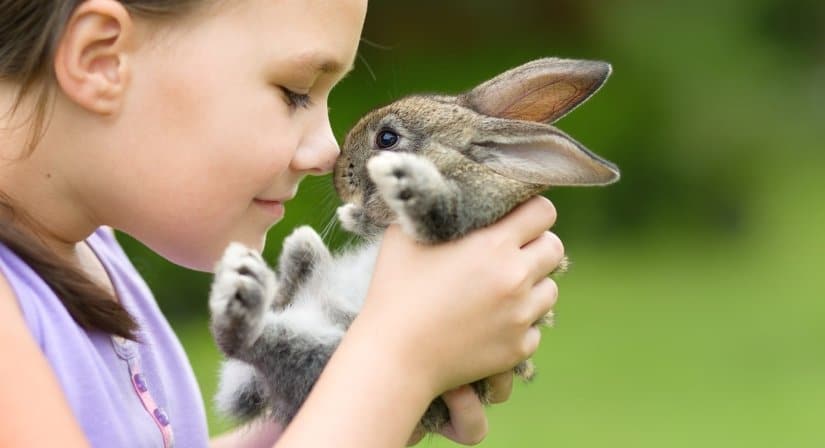
Rabbits are wonderful pets, and thrive on plenty of daily affection and attention. They can become part of your family when indoors with you. That said, you’re probably wondering about rabbit potty training.
All rabbits can become housetrained very quickly, and learn how to use the litter box in no time. That said, rabbits need space to exercise and should not be caged up all day. Rabbits are friendly and playful pets if treated respectfully. They need to be handled correctly, have the right amount of exercise each day, and have interactive chew toys to chew on for teething purposes, and to avoid becoming easily bored.
What Will I Need to Buy for My Pet Rabbit?
Rabbits need proper housing such as a large rabbit hutch placed in a shady spot in the back yard. The rabbit hutch should be easy for your rabbit to access. It should also be easy for you to get in to, so that you can take proper care of your pet rabbit.
Because diseases in rabbits related to neglect are common if they are abandoned out in the backyard, pet parents need to be sure that they have the proper time and resources to be able to take care of their rabbits. All rabbit hutches need proper ventilation and protection from larger animals, and possibly from wild animals and large predator birds too.
You will also need to get a litter box for indoor use. An all-wire-rabbit cage with a minimum of 12-gauge wire is most preferred by rabbit experts and veterinarians. Keep in mind that your pet rabbit needs both the outdoor hutch and the indoor cage. During the hot summer months, keep your rabbit indoors and allow for outdoor exercise during the early morning hours or late afternoon, when it’s much cooler.
Avoid Heat Exhaustion
Rabbits are extremely sensitive to heat, and most especially to hot, humid weather.
- Never travel with your rabbit in a poorly ventilated car
- Avoid leaving your rabbit outdoors under direct sunlight during summer
- Water down or sprinkle rabbit hutches to cool them off
- Visit your emergency veterinarian immediately if your rabbit is suffering from heat exhausting
- Rabbits will need cold water immersions if suffering from heat exhaustion.
Rabbit Cage Requirements
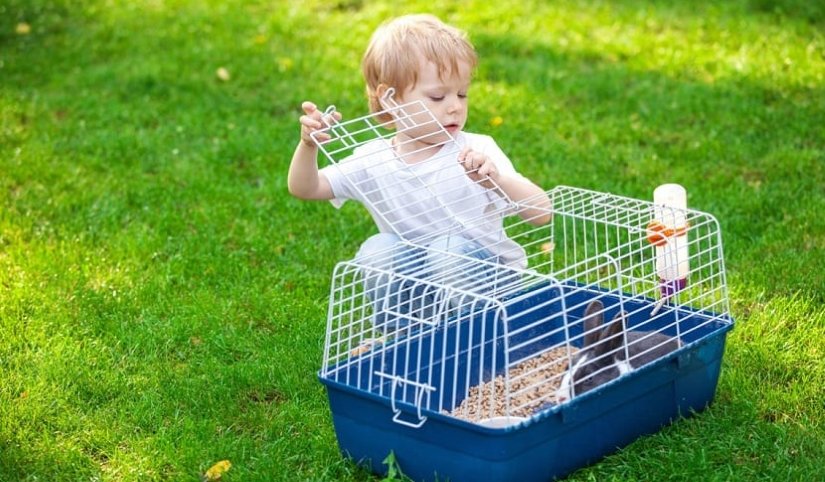
- 16-gauge wire is great for cage flooring to support the rabbit’s weight.
- Rabbit cages should be equipped with a feed hopper and a watering system.
- Feed hoppers that are constructed of sheet metal with holes or a sliding screen at the bottom to remove feed particles, work best.
- Rabbits gnaw continuously, so all materials need to be strong enough to hold up.
- Stainless steel watering valves hold up well.
- Water bottles with sipper tubes are also an option for your pet rabbit.
- Bowl and cans can easily become contaminated, and need to be washed and disinfected every day.
- All rabbit cages need to be enriched with rabbit toys that are safe and non-toxic to chew on.
- Your pet rabbit should not be in his cage all day long. Rabbits need outside time to run every single day.
How Much Do I Need to Spend?
Rabbits make inexpensive first pets compared to horses, dogs, and even cats. That said, you will still have to buy your rabbit his best cage, organize an outside spot for him where he can run each day, and have good veterinary care. Rabbits also do well with a high-quality diet for health and longevity. They will need to be brushed each day, and will need their own grooming kit as well. Some rabbit breeds with long hair may shed heavily at times, and extra care needs to be given.
Rabbit Expenses
Cost of Pet Rabbit $15-$60
Some rabbit breeds may cost much more. This all depends on breeding and where you purchase your rabbit. Large pet stores sell rabbits for reasonable prices. You can also purchase your first pet rabbit from a rabbit breeder, or adopt from a shelter and pay just an adoption fee. With so many different rabbit breeds to choose from, it’s best to first decide what rabbit breed you most prefer.
Outdoor Housing
- Rabbit exercise run $159- $300
- Rabbit hutch $100-$160
Indoor Housing
It’s best to have both outdoor and indoor housing so that you can spend quality time with your pet rabbit each day. During the hot summer months, it’s more comfortable for your rabbit to be indoors and outside during the early morning or late afternoon hours.
By keeping your pet rabbit indoors with you, you’ll find that you’ll bond with your rabbit in no time at all. Because rabbits have a physical and psychological need to chew, you will need to provide your new furry best friend with a variety of safe and non-toxic chew toys.
- Non-toxic and safe chew interactive chew toys $3.99-$15.99
- Food bowl $2.99
- Water bottle $3.99
- Litter box $3-$10
- Litter $3-$12
- Rabbit carrier $7.99-$45.99
- Rabbit hay, food, treats and bedding. Rabbit grain runs from $5-$15 depending on size.
- Rabbit cage $36.99-$66.99
- Rabbit bed $5- $50
- Rabbit pen with a non-slip floor $9-$60
- Rabbit grooming brush $4-$8
- Rabbit harness $7.99-$15.99
Rabbit Veterinary Care
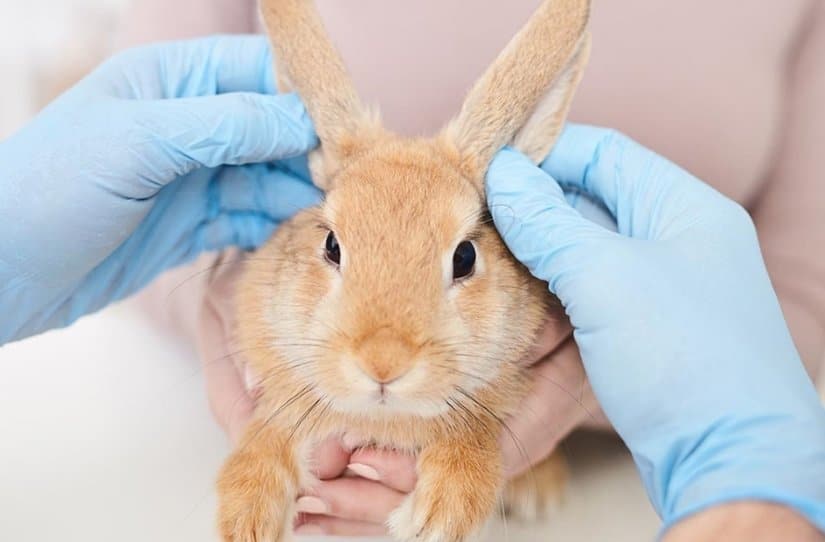
Your pet rabbit will need regular veterinary care and vaccinations. You will also need to spay or neuter your pet rabbit. That said, having pet health insurance protects you in emergency situations should your rabbit need surgery or emergency veterinary care. Spaying or neutering may run from $60-$200 depending on the veterinarian that you visit.
Rabbit Health Insurance
For rabbit owners, having rabbit health insurance should be a priority in case of a veterinary emergency. When you adopt or purchase a pet rabbit you will need to make sure that he or she gets regular veterinary care. Rabbit health insurance protects your pet rabbit, and helps your rabbit live a long and healthy life.
Pet health insurance also covers cancer, behavioral therapy, and holistic treatments. That said, you will need to specifically check with your pet insurance to see if they cover rabbits. Always read the small print on any pet insurance policy to make sure that you know what is covered.
Compare numerous pet health insurance coverages to get the best rate possible, as well as the coverage that’s most needed when it relates to rabbit illnesses.
Do Rabbits Make Good Pets?
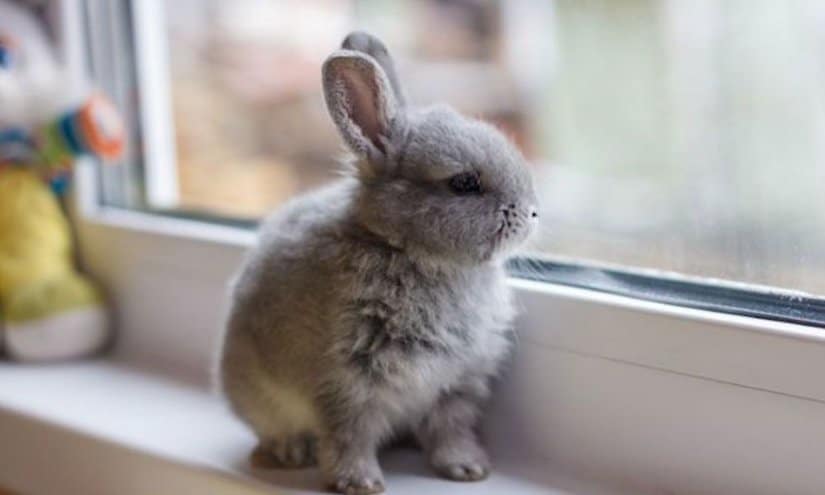
Rabbits are relatively easy to care for. They are friendly, intelligent and kind. That said, you will still need to take good care of your rabbit. Rabbits groom themselves frequently, and have constantly growing teeth.
By providing your rabbit with lots of interactive chew toys, you will be helping your rabbit to wear his teeth down with something to chew on. Long-haired pet rabbits may get hairballs if not groomed daily.
Rabbit pet parents should use a soft rabbit grooming brush every day to prevent hairball issues which may block digestion or cause other medical issues. Selecting your first pet rabbit from a rescue is always a wonderful option.
Your rabbit should have a shiny coat, with no discharge from the eyes or nose. They should also show no lameness or joint issues when hopping around.
You will also need to check for bare skin patches to make sure that your pet rabbit has no hot spot or other skin issues. These are usually easy to deal with, and either a change of diet or bedding is recommended. Rabbits may bald after shedding, and some bald spots may appear. These are nothing to worry about, and will fill up once shedding is over.
Choosing Your Indoor Pet Rabbit

Rabbits are small mammals that have been kept as pets since the 1800s. They are very popular worldwide, and come in a variety of colors, fur lengths, and sizes. A male rabbit is called a buck, and a female, a doe. Baby rabbits are called kits. Rabbits are born both blind and hairless. Here are some rabbit breeds to choose from. Rabbits can weigh from 2-6 pounds.
- English Angora
- Netherland Dwarf
- Beveren
- English Lop
Small Rabbit Breeds (2-6 pounds)
- American Fuzzy Lop
- Britannia Petite
- Dwarf Hotot
- Holland Lop
- Dwarf Polish
- Florida White
Medium Rabbit Breeds (6-9 pounds)
- American Sable
- Belgian Hare
- English Angora
- French Angora
- Silver Marten
- Standard Chinchilla
Large Rabbit Breeds (9-11 pounds)
- American
- American Chinchilla
- Beveren
- Californian
- New Zealand
- English Lop
How to Look After Your Pet Rabbit?
As with all mammals, pet rabbits will need vaccinations and booster shots. They will also need regular veterinary and dental care. Your veterinarian will check your rabbit’s mouth, face, jaw to check for unusual dental swelling that may be filled with fluid and for solid swellings. Your veterinarian may use an otoscope to check your rabbit’s ear canals for infection.
Rabbit molar teeth can be inspected with a pediatric nasal speculum. Gender can be determined by your veterinarian. A rabbit’s normal body temperature should be between 103 to 104 degrees F. If your rabbit’s temperature is less than 100.4 degrees F or higher than 105 degrees F, your rabbit will need to be examined by your veterinarian.
When considering whether to neuter or spay your pet rabbit, play it safe and understand that it prevents unwanted litters, spraying, aggressive behaviors in male rabbits, and also uterine cancer in female rabbits.
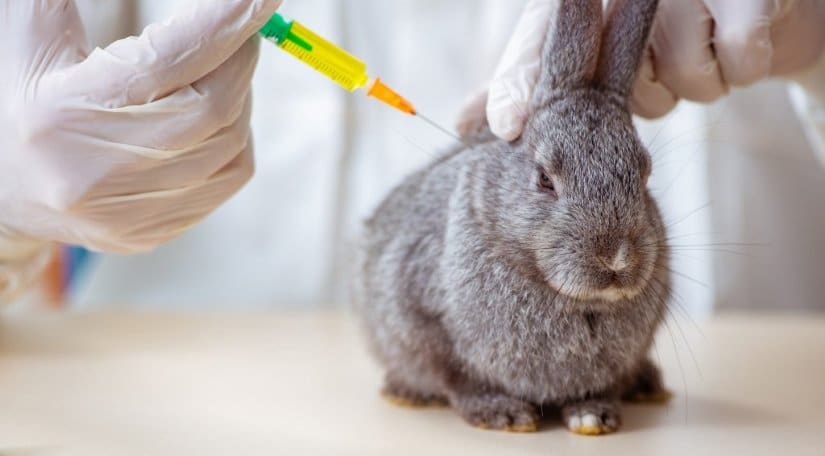
No matter how great a rabbit pet parent you are, you will need to remember that this small mammal does best with routine vaccinations and booster shots. “Rabbits need vaccinations to prevent/protect against myxomatosis, Rabbit (Viral) Haemorrhagic Disease (R(V)HD) and a new strain of R(V)HD – R(V)HD2 – all of which cause intense suffering to rabbits,” adds the RSPCA.
The RSPCA Recommends
- Combined vaccines for yearly protection against both myxomatosis and R(V)HD. Rabbits can be vaccinated from five weeks.
- A single separate vaccine is required to protect against R(V)HD Rabbits can be vaccinated from as young as 10 weeks of age.
- All vaccination requirements will differ depending on the country you live in. Consult with your veterinarian as to the best advice.
Signs of Illness
- Discharge from the nose or eyes
- Dark red urine
- Fatigue
- Drooling
- Diarrhea or constipation
- Abnormal movement
- Breathing problems
- Fur loss
- Red and swollen skin
- Body temperature less than 100.4 degrees F or more than 105 degrees F
- Lack of appetite
- Loss of weight
It can be difficult at times to spot if your pet rabbit is not feeling well. As usual, if you have any doubt, consult with your veterinarian. In hot dry climates, your rabbit will need to drink lots of cool fresh water to prevent hydration. Their bodies are 58% water, and rabbits need to drink at least 120mg/kg every day.
If you suspect that your pet rabbit is dehydrated, you will need to visit your emergency veterinarian. Your pet rabbit will stop eating if deprived of water after three days. That said, if there is no food to eat, your rabbit will drink more water. Feed your rabbit a high-quality diet pellet, hay and fresh water.
Water intake needs to be monitored a few times a day with pet rabbits to make sure that they are well-hydrated. To get around any difficulties, automatic watering systems work great, yet make it difficult to gauge exactly how much water your pet rabbit is drinking. A water bottle with sipper tubes allow for an easier evaluation of how much water your pet rabbit is actually drinking each day.
For pet parents worried about Staphylococcus aureus, research shows that it is able to cause a variety of infections in numerous other host species. A 2016 study from the University of Hull, GKP demonstrated that “Although also recognized as a versatile and virulent pathogen among companion rabbits, in particular as a cause of severe abscesses, few data are available on the S. aureus strains causing disease in this host,” via Journals Plos.
Rabbit Nutritional Requirements
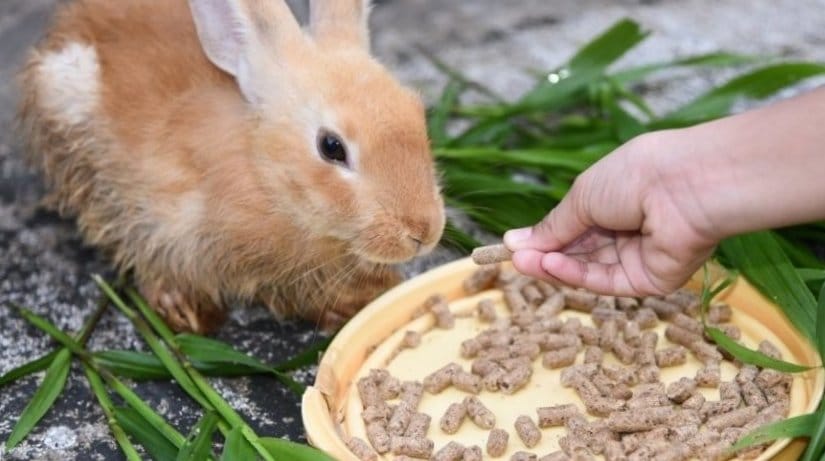
Your rabbit’s high-quality diet is the foundation of his good health and longevity. While it is relatively easy to feed your herbivorous rabbit a healthy diet that is high in fiber, protein, and low in carbohydrates, you will also need to watch out for too high a calcium diet that may result in renal problems.
Rabbits need to eat plenty of greens, nutrient-rich leaves that are high in fiber. If your rabbit eats a low fiber diet, he may develop intestinal problems like enterotoxaemia. This can result in severe diarrhea and even possibly death.
The best fresh foods for rabbits are carrots, broccoli, carrot tops, mustard greens, turnip greens, dandelion greens, kale, lettuce, spinach and parsley. Rabbits should also have hay throughout the day and rabbit pellets for grain. Consult with your veterinarian for the right amount of pellet feed to give your rabbit, since many veterinarians are recommending less grain and more leafy green veggies instead.
On the other hand, feeding your rabbit a diet that is too high in fiber (more than 20% crude fiber) may result in constipation, and a diarrhea called mucoid enteritis. Instead of just feeding your rabbit the same thing every day, it’s necessary to ensure that there is a proper balance between fiber and other dietary ingredients.
- Vitamin D, A, E are necessary and important for your pet rabbit.
- Rabbit diets that contain enough alfalfa meal provide enough vitamin A.
- Vitamin E deficiency can cause infertility, muscular dystrophy, and fetal deaths
- Ill rabbits may have an increased vitamin requirement. Consult with your veterinarian about this.
- Pelleted rabbit diets should be high-quality, and need to have all the necessary ingredients for rabbits.
- Airtight containers are great to store rabbit pellets.
- Examine your rabbit’s life stage to see what nutritional requirements he needs.
- Provide fresh clean water a few times a day.
- Mineral salt blocks are a good addition for rabbits that are on an alfalfa hay and grain like oats, corn or barley to prevent kidney damage from commercial pet food from calcium carbonate deposits.
- Lowering calcium levels to 0.4 to 0.5% of your rabbit’s feed will help reduce any problems. This should not be done for rabbits that are nursing.
Healthy skin and a shiny coat result from a high-quality diet. They are more than just signs of good grooming! By feeding a high-quality diet to your pet rabbit and having good hay available at all times, you’ll be able to prevent hair balls and to also maintain a healthy digestive tract in your rabbit.
The main thing to consider when feeding your pet rabbit is the life stage of the rabbit. To better understand the importance of good nutrition for your rabbit, consult with your veterinarian for nutritional advice. Good gut health in rabbits is important for overall immune function.
While it is impossible to predict longevity, we can nevertheless give our pet rabbits the veterinary care that they need, and a stimulating and safe environment in which they get the right amount of daily exercise and mental stimulation.
By making good choices for our pet rabbits, and all pets, we can encourage a healthy lifestyle and limit negative environmental factors like pesticide use near our rabbits or vaccine overloads. Our rabbit friends make for wonderful companions. They also lower stress-levels, improve quality of life, and make for intelligent and sensitive pets.
That said, if you’re welcoming a new pet rabbit, keep in mind that rabbits will live from 5 to 15 years, so this is a long term commitment. Rabbits are unique, very social, and through playful exercise, make for easy bonding and great friendships.
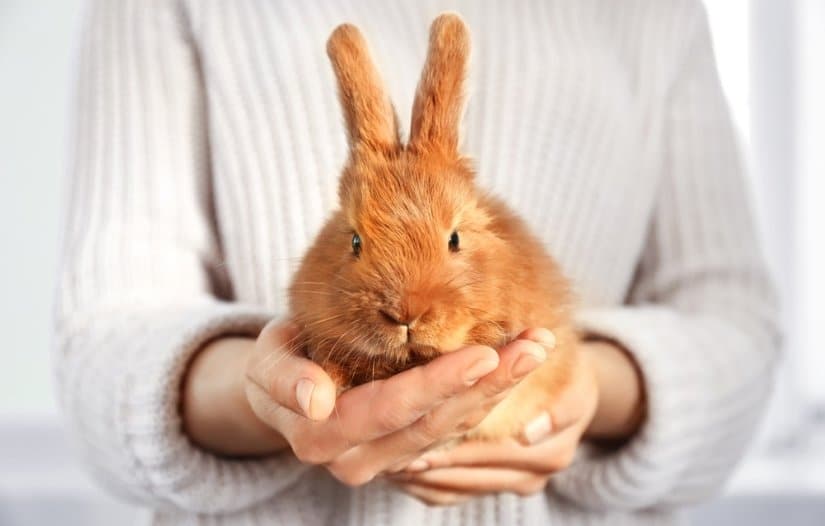
Thank you for the information on how rabbits are relatively easy to care for. Coincidentally, I have decided that I want to purchase a rabbit because I want a small animal to take care that can keep me company in my apartment. I would think that just as cats and dogs require grooming, rabbits would require the same thing as well.
One of the most important things you can do is show your rabbit that they’re loved is by spending plenty of time with your bunny every day. I’ve had rabbits for a long time, and I love them. They are so fluffy and fun to be around! Love this! Thank you for sharing!